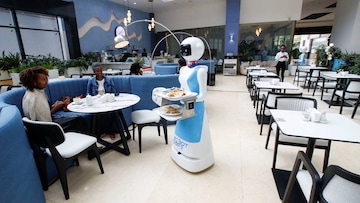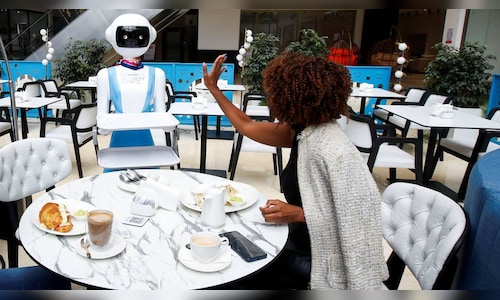Nairobi has a vibrant technology industry with several startups and innovations in operation and has positioned itself as a technology hub in the East African region with the nickname “The Silicone Savannah”.
This is the Robot Café, believed to be the first of its kind in Nairobi and East Africa, where three robots glide between human waiters serving food to mesmerized customers.
These pre-programmed robots were purchased for entertainment. Cafe owner Mohammed Abbas says he experienced robot service in Asian and European countries and decided to invest in them.

Read also: The best holiday destinations for each month of the year
“It was very expensive to import the robots,” he says, but adds that the investment has paid off, because the restaurant “is often full of curious customers” who come to experience the robotic service.
Customer Packson Chege grabs a plate of fries from the robot’s tray as his friend films the experience across the table.
“I can say that it is something unique because here in our country, Kenya, I have never seen a restaurant like this, so I think for me it is a good idea of the owner of this restaurant,” he said.
The three robots, which are named Claire, R24 and Nadia, are not programmed to have a full conversation with customers, but they can say “Your order is ready, welcome” and then people have to press an exit button after collecting their food from the tray.
They are operated by waiters via an app on an iPad.
Human waiters are still important in the cafe’s operations, because they take orders from customers who don’t use the online ordering option. The waiters then place the food on the robot’s tray when it’s ready and serve drinks in person.
Technology is expected to revolutionize the workforce of the future globally, and especially in Africa, where there is a young population with an average age of 19 years.
But the cafe manager says robots are not a replacement for human waiters as they cannot provide all services.
“At no point are robots capable of fully functioning in all the services that are supposed to be performed in the restaurant without the human touch,” said John Kariuki. “Robots are actually too expensive for us to purchase, so if you’re trying to save money, it’s not going to work if you choose the robotics route.” Edith Ojwang, a hospitality industry expert, said there is room for robotic and human services to coexist in the industry.
Read also: 10 Foreign Destinations for Budget Holidays Where Indian Rupee Is Worth More
“The hospitality industry is very diverse. We have customers who prefer robotic service and full automation, but we also have customers who prefer human service, the human touch and the warmth that comes with it, so that it is not a total threat to human labor because of the diverse nature of the hospitality customer base,” he said.
Disclaimer:
The information contained in this post is for general information purposes only. We make no representations or warranties of any kind, express or implied, about the completeness, accuracy, reliability, suitability or availability with respect to the website or the information, products, services, or related graphics contained on the post for any purpose.
We respect the intellectual property rights of content creators. If you are the owner of any material featured on our website and have concerns about its use, please contact us. We are committed to addressing any copyright issues promptly and will remove any material within 2 days of receiving a request from the rightful owner.

